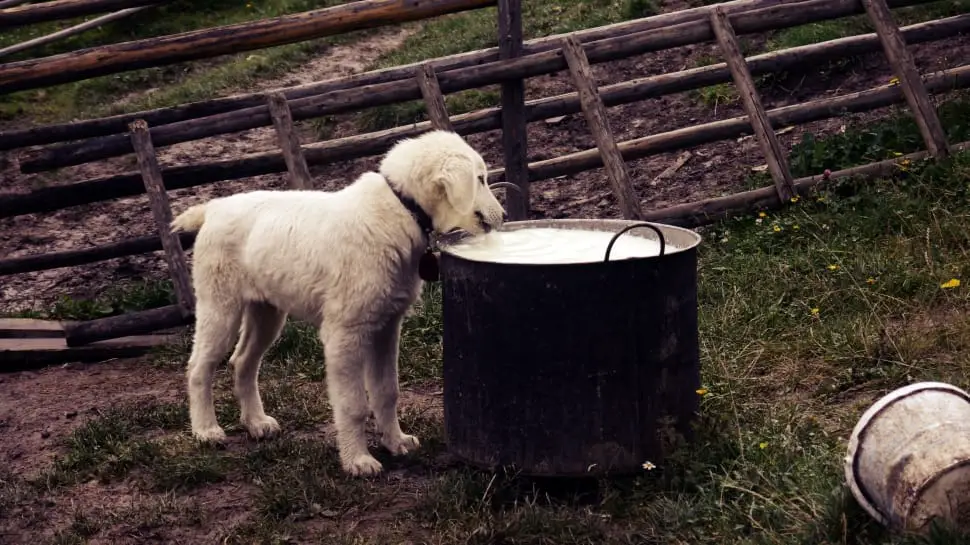Are you a new puppy owner unsure about the proper weaning time for your furry friend? Weaning is an important stage in a puppy’s development. It helps them transition from their mother’s milk to solid food.
Puppies typically wean between 4-6 weeks of age, but what happens when they are weaned too early?
In this article, we will explore the signs that your puppy may be weaning too early. Also, I will explain what steps you can take to ensure their health and well-being during this crucial stage.
When Are Puppies Supposed To Start Weaning

As a responsible pet owner, it’s essential to understand when puppies should start weaning. Puppies start to wean between 4-6 weeks of age, as their baby teeth start to emerge, signaling their readiness for solid food.
It’s important to note that the weaning process shouldn’t be rushed, as sudden changes in diet can cause digestive problems such as diarrhea or vomiting.
Instead, a gradual transition should be made, with the introduction of soft, moistened food that is easily digestible. As the puppies get more comfortable eating solid food, you can gradually increase the amount and start to decrease the amount of milk they receive from their mother.
Watching your puppies during their weaning process is crucial to their health, so be sure to observe their eating habits, and if in doubt, seek advice from your veterinarian.
See also: The Importance of Gentle Weaning for Puppies
How To Recognize When Puppies Are Weaning Too Early

Here’s a step-by-step guide on how to recognize when puppies are weaning too early:
Step 1: Check the Age of the Puppies
The recommended weaning age for puppies is between 4-6 weeks of age. If the puppies are younger than 4 weeks, they are likely not ready for solid food and still need to nurse from their mother.
Step 2: Monitor Their Weight
During the weaning process, it’s essential to monitor the puppies’ weight. If the puppies are consistently losing weight or not gaining enough weight, it might be an indication that they are not getting enough nutrition.
Step 3: Look for Signs of Hunger
If the puppies still seem hungry after nursing or eating solid food, this could also be a sign that they are weaning too early. Look for signs such as persistent crying, rooting behavior, and increased restlessness.
Step 4: Observe Their Behavior
Observe the puppies’ behavior to see if they appear lethargic or weak. A lack of energy or unusual behavior could be a symptom of insufficient nutrition during the weaning process.
Step 5: Check for Digestive Issues
If the puppies are experiencing diarrhea or vomiting, it could be a sign that they are weaning too early. These digestive issues can be caused by the sudden introduction of solid food or a diet that is not properly balanced.
Step 6: Consult with a Veterinarian
If you’re unsure whether the puppies are weaning too early or are concerned about the weaning process, it’s always best to consult with a veterinarian. They can provide guidance and ensure that the puppies are receiving the proper nutrition and care they need during this crucial stage of development.
By following these steps, you can ensure a healthy weaning process for your puppies and help identify any potential issues that may arise.
What Causes Early Weaning in Puppies
Insufficient Milk Production
One of the most common causes of early weaning in puppies is a lack of milk production in the mother. The mother may not have enough milk to provide for all of her puppies, or she may have a medical condition that prevents her from producing enough milk.
Health Issues in the Mother
If the mother dog is dealing with a health issue, she may not be able to nurse her puppies for an extended period of time. Conditions such as mastitis, which is an inflammation of the mammary glands, can impact a mother’s ability to nurse.
Behavioral Issues in the Mother
Sometimes, the mother dog may experience behavioral issues that prevent her from nursing her puppies for an extended period of time. She may be stressed or anxious, refusing to nurse or pushing her puppies away.
Separation from the Mother
If the mother dog is separated from her puppies at a young age, it can lead to early weaning. Puppies rely on their mother’s milk for proper nutrition and without it, they may not receive the necessary nutrients to thrive.
Inadequate Nutrition
In some cases, the mother dog may not be receiving adequate nutrition, which can impact the amount and quality of her milk. Puppies that don’t receive enough milk or proper nutrition during weaning may suffer from malnutrition or other health problems.
Illness or Parasites in Puppies
Puppies that are dealing with an illness or parasites may experience early weaning as a result. These conditions can impact their appetite and make it difficult for them to eat solid food or nurse from their mother.
By understanding the potential causes of early weaning in puppies, you can take steps to help ensure healthy development for your furry friends. If you’re concerned about early weaning or unsure about how to properly wean your puppies, be sure to consult with a veterinarian for guidance and support.
How To Prevent and Address Early Weaning in Puppies
Step 1: Ensure Proper Nutrition for the Mother
One of the most crucial steps to prevent early weaning is to ensure proper nutrition for the mother dog. This includes providing her with a balanced diet that is high in protein and other essential nutrients to support milk production.
Step 2: Monitor the Mother’s Health
Monitor the mother dog’s health regularly, and seek veterinary attention if you suspect any issues. Any illnesses or problems that impact her milk production or health should be addressed promptly to prevent early weaning.
Step 3: Monitor the Puppies’ Health and Weight
It’s essential to monitor the health and weight of the puppies during the weaning process. If you notice any signs of illness or malnutrition, consult your veterinarian promptly.
Step 4: Gradually Introduce Solid Food
It’s important to gradually introduce solid food when puppies are ready to wean. Starting with soft, moistened food can make it easier for puppies to transition from milk to solid food. Monitor their reactions to solid food and adjust as necessary.
Step 5: Watch for Signs of Stress in the Puppies
Puppies that are weaned too early may experience stress-related issues such as anxiety, lack of appetite, or lethargy. Keep an eye on their behavior, and if you notice any signs of stress, consult with your veterinarian.
Step 6: Address Parasites and Other Health Issues
If the puppies are dealing with parasites or other health issues, it can impact their ability to wean successfully. Consult with your veterinarian to address these issues promptly.
By following these steps, you can help prevent early weaning in puppies and ensure they receive the necessary nutrition and care for healthy development. Remember that consulting with your veterinarian is always the best way to address any concerns or issues during the weaning process.
In Conclusion
Ensuring your puppy is weaned properly is crucial to its healthy development. If you suspect that your puppy is weaning too early, it’s important to closely monitor their behavior and health.
Paying attention to the signs and taking the necessary steps to support your puppy during this time can help ensure a healthy start for your furry companion.
Remember, your veterinarian can also provide helpful guidance and advice throughout this process. With proper care and attention, your puppy will be on the road to a happy and healthy life with you.





Leave a Reply